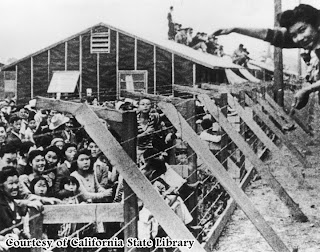DOCUMENT #1:
http://www.ourdocuments.gov/doc.php?doc=74&page=transcript
1. What is an executive order?
2. Who issued this order, and why was this order issued according to the writer?
3. Who is affected by this order and how?
4. Put yourself in the position of one of the groups you mentioned above. How would you feel about this executive order?
5. Do you think it was legal to issue this order?
6. Should it be legal to issue an order like this? Under what circumstances? Why or why not?
7. Can you think of any other examples where an order like this has been issued in America? The world?
8. Other than this order, what other options might America have considered when deciding how to respond to the attack on Pearl Harbor?
DOCUMENT #2:
http://ipr.ues.gseis.ucla.edu/images/Evacuation_Poster.pdf
1. What is the purpose of this poster?
2. Who is the intended audience? Who wrote it?
3. What does the poster instruct people to do? What are people allowed to bring? What are they not allowed to bring?
4. Imagine you are a Japanese-American at this point in time. How would you feel reading this poster?
5. Imagine you are an Anglo-American at this point in time. How would you feel reading this poster?
6. Do you think the measures outlined in the poster were necessary given the circumstances? Why or why not?
DOCUMENT #3:
http://orpheus.ucsd.edu/speccoll/dspolitic/pm/1942/20213cs.jpg
 1. What do you see in this cartoon?
1. What do you see in this cartoon?2. What is the message in this cartoon?
3. Who is this cartoon poking fun at?
4. Who drew this cartoon? Why do you think he drew it?
5. Do you think the cartoonist's views were similar or different than most Americans' during this time? Why?
6. Imagine you were an Anglo-American during this time period. Would you agree with the message in this cartoon? Why or why not?
DOCUMENT #4:
http://www.sfmuseum.org/hist8/evac19.html
1. When was this article written? What was going on in America during this time?
2. What is the topic of the article?
3. What is the tone of the author? How do you think he or she feels about this topic?
4. If the tone of this article was similar to the tone of most news reports during this time, what do you think the average Anglo-American thought of this situation?
5. Do you think the author's view of what was happening was accurate?
6. Do you think the events described in this article are necessary given the time period? Why or why not?
7. Can you think of any other past or current events where something similar to what's described in this article has happened?
8. What do you think America has learned or hasn't learned from this experience?
DOCUMENT #5:
http://www.wisconsinhistory.org/teachers/lessons/secondary/documents/japanese_topaz.pdf
1. What is the purpose of this pamphlet?
2. Who is the intended audience? Who do you think wrote it?
3. Do you think the guidelines in this pamphlet are reasonable? Why?
4. Why do you think this pamphlet was made?
5. Do you think this pamphlet was necessary given the circumstances? Why?
6. How much control do you think other people should have over your daily life? Why?
DOCUMENT #6:
http://www.historyonthenet.com/WW2/japan_internment_camps.htm
1. What does this map show?
2. What is an internment camp?
3. Who oversaw the internment camps?
4. Why do you think these particular locations were selected for internment camps?
5. Why do you think internment camps were created?
6. How do you think these locations are similar or different today?
DOCUMENT #7:
http://www.sfmuseum.org/hist8/editorial4.html
 1. What do you see in this editorial cartoon?
1. What do you see in this editorial cartoon?2. During what time period was this cartoon drawn? What was going on in America during this time period?
3. Who do you think drew this cartoon? Why?
4. What is the purpose of this cartoon?
5. How do you think different ethnic groups, specifically Anglo-Americans and Japanese-Americans, felt about this cartoon?
6. If people saw this cartoon today, what emotions do you think they'd have? Why?
 1. What do you see in this picture?
1. What do you see in this picture? 1. What is this picture showing?
1. What is this picture showing? 
 1. Who are the people on both sides of this fence?
1. Who are the people on both sides of this fence? 1. What's happening in this picture?
1. What's happening in this picture? 1. What's happening in this picture?
1. What's happening in this picture?